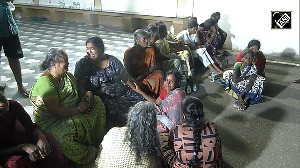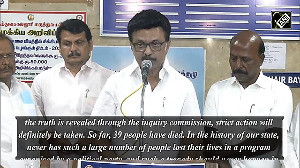Inaugurating the 90th Indian Science Congress in Bangalore on Friday, Prime Minister Atal Bihari Vajpayee said the country should use the expertise of its scientific diaspora in research and development.
"Since the Indian scientific diaspora is more than willing to contribute to our national development, we should devise pragmatic and flexible schemes to enable them to return and work in our science and technology institutions," the prime minister said.
Blaming the bureaucratic culture in many of the scientific and technology institutions for the brain drain, Vajpayee said the country was facing a problem of diversion of talent away from R&D to non-scientific careers in both government and private sector.
"Our bureaucratic culture has been the main cause of migration by our talented scientists and technologists to other countries regularly over the years.
"We also need to examine why so many our talented younger scientists do not consider a career in science worthwhile. Whatever the reasons, we must face this issue squarely by taking visible, concrete steps to give promising scientists and technologists the opportunities, recognition, standing, and adequate material compensation to stay back," Vajpayee said.
The prime minister said the scientific community should ensure that its institutions do not get afflicted with the culture of government agencies.
"Talent should not be suppressed and individualism should not replace teamwork. Seniority should not displace merit. Inadequate attention to these aspects results in our talented younger scientists getting frustrated," Vajpayee said.
In the inaugural address, the prime minister also referred to the disconnect between science and national policies, thanks to the very nature of their complexity.
"We live in an age when various national policies concerning security, economy, social development, and environment are characterised by immense complexity. They call for a multidisciplinary approach.
I appeal to our scientists and technologists to be proactive in throwing light on policy matters. At the same time, I also appeal to our policymakers... to proactively seek such inputs from the scientific fraternity," he said.
The prime minister also unveiled the Science and Technology Policy, 2003, which is aimed at making India a developed nation in the current decade.
Drafted by the Ministry of Science and Technology under the aegis of the Union Minister for Human Resource Development, Science and Technology and Ocean Development, Murali Manohar Joshi, its objectives are:
To ensure that the message of science reaches every citizen of India to advance scientific temper and make India emerge as a progressive and enlightened society. To make every Indian participate in the development of science and technology and its application for human welfare.
To ensure food, agricultural, nutritional, environmental, water, health and energy security of the people on a sustainable basis.
To mount a direct and sustained effort on the alleviation of poverty, enhancing livelihood, security, removal of hunger and malnutrition; reduction of drudgery and regional imbalances, both rural and urban, and generate employment by using scientific and technological capabilities along with traditional knowledge pool.
To foster scientific research in universities and other academic, scientific and engineering institutions, and attract the brightest young persons... in science and technology. To build and maintain centres of excellence to raise the level of work in selected areas to the highest international standards.
To promote the empowerment of women in all science and technology activities, and ensure their full and equal participation. To provide autonomy and freedom of functioning to all academic and R&D institutions so that an ambience for creative work is encouraged, while ensuring that the science and technology enterprise in the country is committed to its social responsibilities.
To establish an Intellectual Property Rights regime for generating and protecting intellectual property by all types of inventors. The regime will also provide a strong, supportive and comprehensive policy environment for speedy and effective domestic commercialisation of such inventions for the maximum benefit of the public.
To ensure high-speed access to information both in quality and quantity at affordable costs; and create digitised, valid, and usable content of Indian origin.
To encourage research and application for forecasting, prevention, and mitigation of natural hazards, especially floods, cyclones, earthquakes, drought, and landslides.
Outlining the objectives in the presence of the prime minister, Joshi said in his address that the policy was framed keeping in view the rapidly changing world order.
"Recognising the changing context of the scientific enterprise, and to meet present national needs in the new era of globalisation, the Union government has enunciated these objectives. The policy also reiterates India's commitment to participate as an equal and vigorous global player in generating and harnessing advances in science and technology for the benefit of all humankind," he said.
ALSO READ





